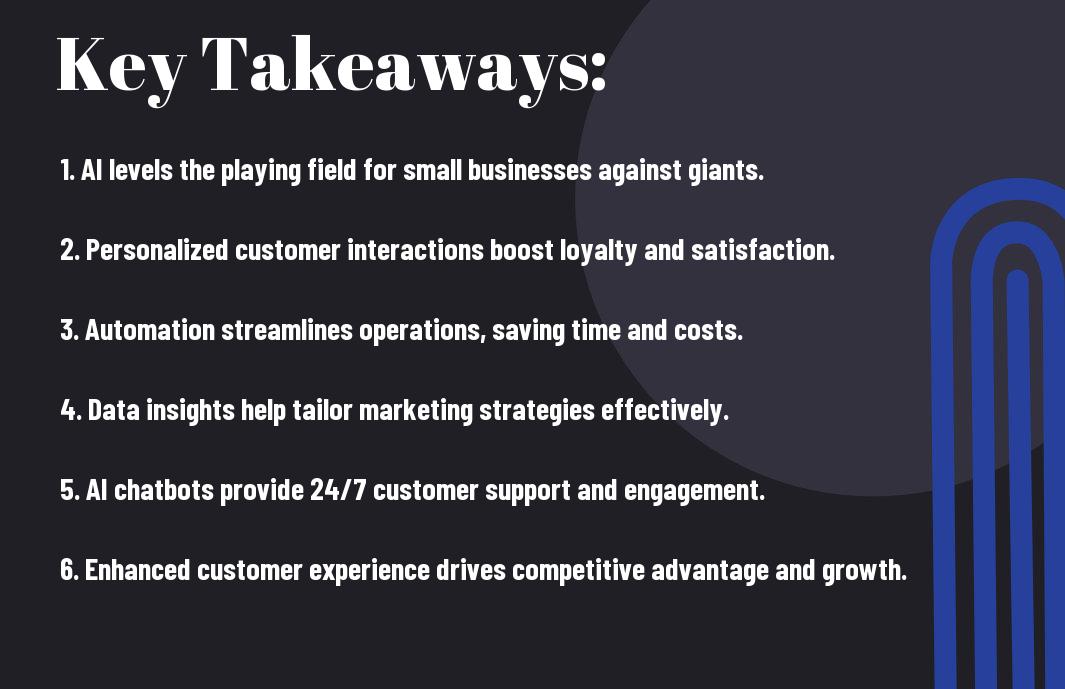Most small business owners are aware of the growing challenges they face when competing against industry giants. However, artificial intelligence (AI) offers innovative solutions that can transform the customer experience. By leveraging AI tools, you can enhance personalization, streamline operations, and ultimately create a more engaging atmosphere for your customers. In this blog post, we’ll explore how you can harness the power of AI to elevate your business, ensuring you not only survive but thrive in a competitive landscape.

Key Takeaways:
- AI-powered tools can enhance personalization in customer interactions, allowing small businesses to tailor their services and products to individual preferences, thereby improving customer satisfaction.
- Implementing AI solutions can streamline operations and reduce costs, enabling small businesses to compete more effectively with larger industry players by providing quicker and more responsive service.
- Data analytics driven by AI can provide actionable insights into customer behavior and market trends, helping small businesses make informed decisions and adapt their strategies more swiftly.
Understanding Customer Experience
To succeed in today’s competitive landscape, understanding customer experience is vital for small businesses looking to thrive. This encompasses every interaction your customers have with your brand, from first impressions to after-sales support. With the rise of artificial intelligence, you can now analyze customer behavior and preferences, enabling you to tailor your offerings and stand out amidst industry giants.
Importance of Customer Experience
Against the backdrop of fierce competition, delivering exceptional customer experience can differentiate your business and build lasting loyalty. When customers feel valued, they are more likely to return and recommend your services to others, boosting your reputation and growth potential.
Key Components of Customer Experience
Customer experience is a multi-faceted concept that includes interactions across various touchpoints, such as product quality, customer service, and personalization. Each of these elements shapes how customers perceive your brand and influences their likelihood of returning.
In fact, paying attention to the key components of customer experience can lead to significant improvements in customer satisfaction and retention. Elements like responsive service, user-friendly interfaces, and personalized communications are instrumental in creating an engaging experience. By analyzing feedback and adapting your strategy, you can enhance your offerings and make customers feel valued, ultimately transforming their experience with your brand into a positive journey that stands out against the competition.
Role of AI in Enhancing Customer Experience
Some small businesses are leveraging AI to elevate customer experience, enabling them to level the playing field against larger competitors. By integrating AI-driven technologies, you can gain insights into customer preferences, streamline interactions, and optimize service delivery, enhancing overall satisfaction.
Personalization and Customization
Between understanding customer data and implementing AI solutions, you can create personalized experiences that cater to individual needs. AI allows you to analyze purchasing patterns, enabling tailored recommendations that foster a deeper connection with your customers.
Predictive Analytics and Insights
On harnessing predictive analytics, you can anticipate customer behavior and trends. This forward-thinking approach enables you to make informed decisions that align with your audience’s expectations.
In addition, predictive analytics provides you with valuable insights into customer preferences and future purchasing behaviors, allowing you to optimize inventory and marketing strategies accordingly. By identifying patterns, you can proactively address issues and enhance satisfaction, minimizing potential negative experiences. This results in a stronger customer relationship, as you’re equipped to meet their needs before they arise. Ultimately, employing predictive analytics creates a data-driven approach that supports growth and maintains a competitive edge for your small business.
AI Tools for Small Businesses
Now, small businesses have the opportunity to leverage AI tools that can significantly enhance customer experience and level the playing field against larger competitors. By implementing these solutions, you can optimize your operations, personalize customer interactions, and gather valuable insights that foster growth. From chatbots to advanced analytics, AI tools are here to support you in delivering better services while maximizing your efficiency.
Chatbots and Virtual Assistants
On your journey to improving customer experience, chatbots and virtual assistants play an vital role. These AI-driven tools can handle inquiries around the clock, providing instant responses and maintaining engagement without requiring extensive manpower. As a result, you can enhance service levels while reallocating your human resources to focus on more complex tasks.
Customer Relationship Management (CRM) Software
Below, CRM software empowers you to manage your customer interactions more effectively. By utilizing AI-enhanced features, you can track customer data and behavior, analyze trends, and tailor your marketing efforts to maximize retention and satisfaction.
Consequently, implementing CRM software can transform the way you handle customer relationships. With real-time data analysis, you can identify customer preferences and streamline communication to ensure prompt support. This leads to enhanced customer loyalty and improves your chances of upselling and cross-selling. Moreover, an effective CRM system allows for personalized marketing campaigns, which can greatly increase your engagement and conversion rates while minimizing wasted efforts. Overall, integrating CRM into your business strategy is a powerful way to harness the full potential of your customer data.
Implementing AI Strategies
Keep in mind that implementing AI strategies requires a systematic approach tailored to your unique business environment. Start by assessing your current capabilities, resources, and goals, as well as understanding how AI can enhance your customer experience. This process will help you to pinpoint relevant technologies and streamline your operations to compete more effectively with larger competitors.
Identifying Business Needs
One of your first steps should be to identify your specific business needs related to customer experience. Assess your customer feedback, market trends, and operational challenges to determine where AI can add value. Focus on pain points in your current processes and how AI can help you address them efficiently.
Creating a Roadmap for AI Integration
Identifying a clear pathway for AI integration is imperative for effective implementation. Your roadmap should outline the necessary steps, resources, and timelines for deploying AI technologies in your business. This strategic plan will guide you through phases like research, testing, and scaling, ensuring that you can measure progress and make adjustments as required.
Considering your organization’s specific goals, the roadmap for AI integration should also factor in your budget, technology infrastructure, and team capabilities. Focus on a step-by-step approach to avoid overwhelming your resources. Prioritize quick wins that enhance customer engagement while planning for long-term projects that align with your vision. It’s important to factor in potential risks and make provisions for employee training, ensuring a smooth transition to an AI-enhanced customer experience.
Overcoming Challenges in Adoption
Your journey to implement AI in your small business may encounter several challenges. Recognizing these obstacles is crucial for a smooth transition. You must address issues such as budget constraints, employee training, and resistance to change. By proactively identifying these challenges, you can create a strategy that leverages AI effectively while still aligning with your business goals.
Cost Considerations
Any significant technological investment requires careful financial planning. You might worry about the initial costs of AI tools and platforms. However, consider the long-term benefits of improved efficiency and enhanced customer experience that can outweigh these costs. Additionally, there are often affordable solutions available specifically for small businesses, making it easier for you to adopt AI without breaking the bank.
Training and Skill Development
One of the biggest barriers to implementing AI is ensuring that your team is equipped with the right skills. Training your employees in AI technologies is vital for the successful integration of these tools into your operations.
Further, investing time and resources in training programs can significantly enhance your team’s capabilities. Providing access to resources, workshops, or online courses can boost their confidence and competence in using AI technologies effectively. Skilled employees will not only improve the efficiency of your operations but also foster a culture of innovation within your company. This investment in skill development is foundational for maximizing the advantages that AI has to offer, ensuring that you stay competitive in the market.

Case Studies of Successful AI Implementation
Not just for the big players, AI has proven to be a game-changer for small businesses as well. Here are some compelling case studies highlighting successful AI implementation:
- Retail Sector: A small clothing store implemented an AI-driven customer recommendation system, resulting in a 30% increase in sales within just three months.
- Food Industry: A local coffee shop used AI chatbots for online orders, leading to a 40% reduction in order processing time.
- Service-Based Business: A small cleaning company adopted AI scheduling tools, improving customer satisfaction ratings by 25% due to more timely services.
- E-commerce: A boutique online store leveraged AI for personalized marketing, leading to a 20% boost in customer retention rates.
Small Businesses Thriving with AI
Thriving in today’s competitive landscape is achievable for small businesses leveraging AI. By implementing tools like chatbots or predictive analytics, you can enhance customer engagement and drive sales. AI enables you to analyze consumer behavior, optimize your marketing campaigns, and even streamline operations, all of which contribute to a stronger market position.
Lessons Learned from Industry Giants
Small businesses can draw valuable insights from industry giants that have successfully integrated AI into their operations.
But success doesn’t come without challenges. As a small business, you can benefit from understanding the scalable AI strategies used by larger organizations, such as focusing on data quality and customer feedback. While industry giants may invest heavily in complex AI systems, your path to success may lie in simpler, cost-effective solutions tailored to your unique needs. The capacity to adapt and innovate will be your greatest ally, allowing you to outsmart rather than outspend the competition.

Conclusion
To wrap up, leveraging AI can significantly enhance your customer experience, allowing your small business to effectively compete with larger industry giants. By integrating AI solutions, you can personalize interactions, streamline processes, and gather valuable insights into customer behavior. This strategic approach not only improves customer satisfaction but also fosters loyalty. For more insights on how to harness AI for your business, check out this resource on How Small Businesses Can Benefit From Artificial ….
FAQ
Q: How can AI enhance customer experience for small businesses?
A: AI can significantly enhance customer experience by providing personalized interactions, improving service efficiency, and enabling data-driven decision-making. By utilizing AI technologies such as chatbots, small businesses can offer 24/7 customer support, addressing inquiries promptly. Additionally, AI can analyze customer behavior and preferences, allowing businesses to tailor their offerings and create targeted marketing strategies that resonate with their audience, ultimately fostering loyalty and satisfaction.
Q: What specific AI tools can small businesses use to compete with larger companies?
A: Small businesses can leverage a variety of AI tools to enhance their competitiveness. For instance, customer relationship management (CRM) systems integrated with AI can help businesses manage leads and customer interactions efficiently. AI-powered analytics tools offer insights into customer trends, enabling better inventory and promotion decisions. Tools like recommendation engines can suggest products based on customer preferences, enhancing the shopping experience. Moreover, social media AI tools can help in analyzing engagement and optimizing marketing campaigns.
Q: Are there any cost-effective AI solutions available for small businesses?
A: Yes, there are numerous cost-effective AI solutions designed specifically for small businesses. Many platforms offer scalable pricing models to accommodate different budgets, such as cloud-based software that requires minimal upfront investment. Open-source AI tools are also available for businesses willing to customize their solutions. Furthermore, several companies provide AI-as-a-service, allowing small businesses to integrate sophisticated AI capabilities without the need for extensive infrastructure, therefore making it easier to access and utilize advanced technology.


